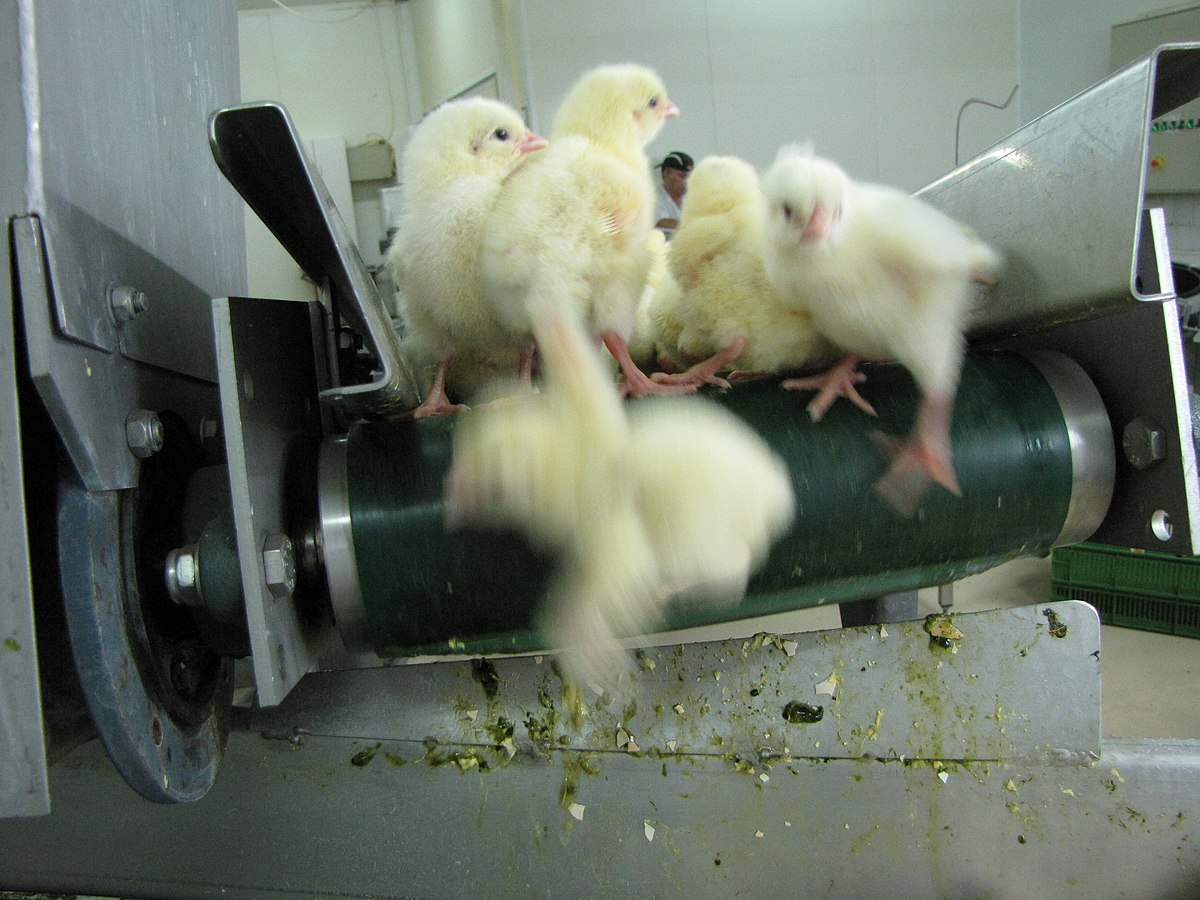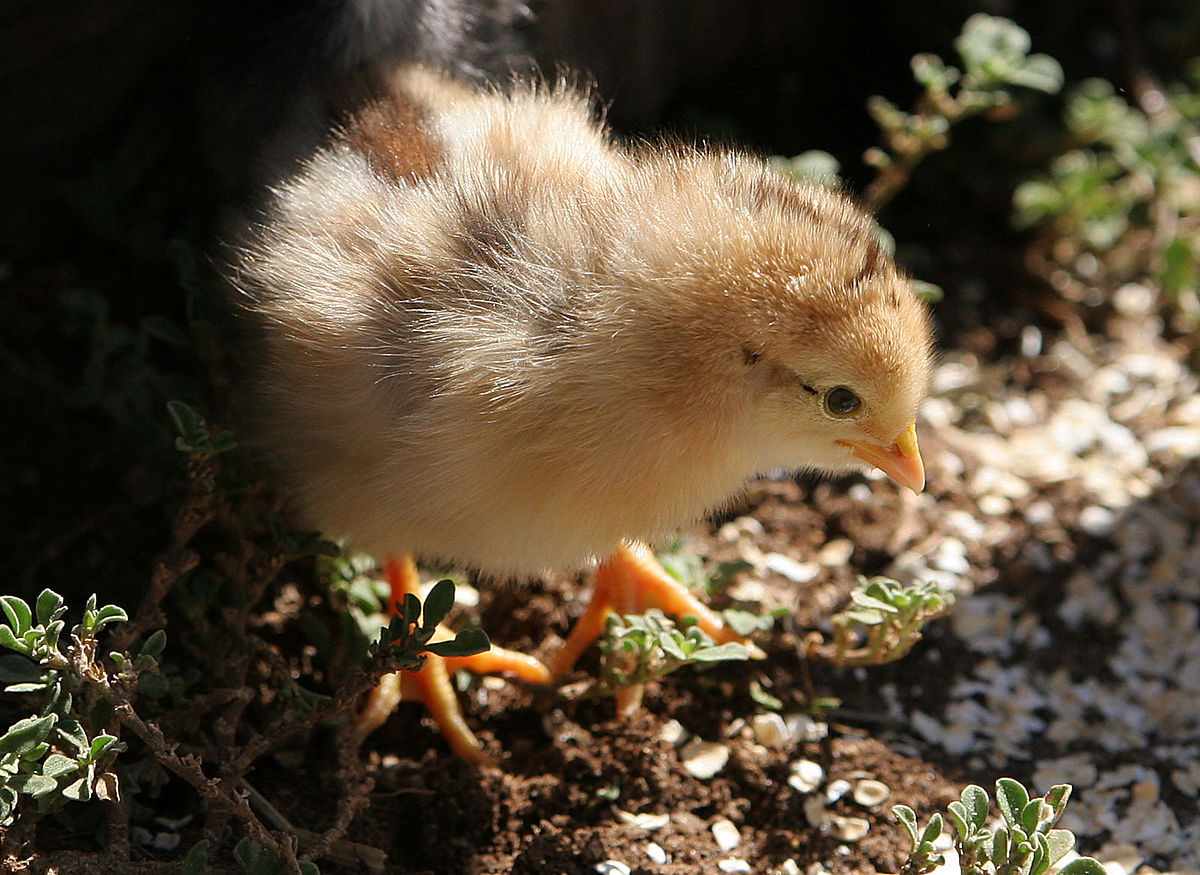- Pronouns
- It
- TNP Nation
- Simone_Republic
Please note that I am providing an explanation of the actual techniques that are to be banned by this resolution copied from Wikipedia.
Proposal under the consideration of European Union to ban chick culling
Proposal led by France, Germany and Portugal to the EU
For background, this paper is presented by the EU on the practice of chick culling and the effects on animal welfare:
EU briefing paper
To add the question asked earlier (on discord): a resolution that forces male chicks from breeds for eggs to be raised to full blown cocks would not work as they cannot compete against bigger cocks from breeds raised for meat in terms of meat content. For example, hybrid White Leghorns are used in egg production, while chickens raised for meat are commonly a hybrid between Cornish hens and Plymouth Rock breeds. Cocks from the Brahma breed can reach 12 pounds, but that's less common commercially.
Explanation (copied from Wikipedia)

 en.wikipedia.org
en.wikipedia.org
Chick culling or unwanted chick killing is the process of separating and killing unwanted (male and unhealthy female) chicks for which the intensive animal farming industry has no use. It occurs in all industrialised egg production, whether free range, organic, or battery cage. However, some certified pasture-raised egg farms are taking steps to eliminate the practice entirely. Worldwide, around 7 billion male chicks are culled each year in the egg industry.
Because male chickens do not lay eggs and only those in breeding programmes are required to fertilise eggs, they are considered redundant to the egg-laying industry and are usually killed shortly after being sexed, which occurs just days after they are conceived or after they hatch. Some methods of culling that do not involve anaesthetics include: cervical dislocation, asphyxiation by carbon dioxide, and maceration using a high-speed grinder. Maceration is the primary method in the United States. Maceration is often a preferred method over carbon dioxide asphyxiation in western countries as it is often considered as "more humane" due to the deaths occurring immediately or within a second.
Because of animal welfare concerns, there is societal opposition to chick culling. In the 2010s, scientists developed technologies to determine the sexes of chicks when they are still in their eggs (in-ovo sexing). As soon as these methods were available on a commercial scale, Germany and France jointly became the first countries in the world to prohibit all chick killing from 1 January 2022, and called on other EU member states to do the same.
Title
I am thinking of "in-oxo determination of sex in farming" because the term "sexing" might be misleading, although Wikipedia uses 'in-ovo sexing" and this title seems shorter.

 en.wikipedia.org
en.wikipedia.org
Category: Moral Decency/Mild
Draft 3
[box]The World Assembly,
Noting that some member states in the multiverse engage in industrial farming of chicks, ducklings, goslings and other species (hereafter, collectively for convenience, "chicks" for all younger members of the said species) for consumption of their eggs and/or meat;
Concerned that in industrial farming, chicks of a particular sex are frequently culled after birth for economic reasons through techniques that may be considered inhumane, such as maceration, cervical dislocation and asphyxiation, and that alternatives such as raising male chicks for egg-laying breeds to full grown size may not be economical against breeds of bigger cocks specifically grown for meat;
Noting that recent advances in technologies regarding low-cost in-ovo sexing (the determination of the sex of chicks inside the egg prior to hatching) in some member states allow eggs that are not viable commercially to be destroyed before hatching, thus substantially reducing concerns over the welfare of chicks;
Draft 1
Draft 3 vs Draft 2: not changed much other than spelling out that this may include non avian species, just to cover for sci -fi RP concerns.
Draft 2 says: "Concerned that in industrial farming, chicks of a particular sex are frequently culled after birth for economic reasons through techniques that may be considered inhumane, such as marceration, cervical dislocation and asphyxiation, and that alternatives such as raising male chicks for egg-laying breeds to adult size may not be economical against breeds of bigger cocks specifically grown for meat;"
Draft 1 had the same in bullet form and had a more detailed description of how chicks are culled such as what marceration is. This has been removed.
Proposal under the consideration of European Union to ban chick culling
Proposal led by France, Germany and Portugal to the EU
For background, this paper is presented by the EU on the practice of chick culling and the effects on animal welfare:
EU briefing paper
To add the question asked earlier (on discord): a resolution that forces male chicks from breeds for eggs to be raised to full blown cocks would not work as they cannot compete against bigger cocks from breeds raised for meat in terms of meat content. For example, hybrid White Leghorns are used in egg production, while chickens raised for meat are commonly a hybrid between Cornish hens and Plymouth Rock breeds. Cocks from the Brahma breed can reach 12 pounds, but that's less common commercially.
Explanation (copied from Wikipedia)

Chick culling - Wikipedia
Chick culling or unwanted chick killing is the process of separating and killing unwanted (male and unhealthy female) chicks for which the intensive animal farming industry has no use. It occurs in all industrialised egg production, whether free range, organic, or battery cage. However, some certified pasture-raised egg farms are taking steps to eliminate the practice entirely. Worldwide, around 7 billion male chicks are culled each year in the egg industry.
Because male chickens do not lay eggs and only those in breeding programmes are required to fertilise eggs, they are considered redundant to the egg-laying industry and are usually killed shortly after being sexed, which occurs just days after they are conceived or after they hatch. Some methods of culling that do not involve anaesthetics include: cervical dislocation, asphyxiation by carbon dioxide, and maceration using a high-speed grinder. Maceration is the primary method in the United States. Maceration is often a preferred method over carbon dioxide asphyxiation in western countries as it is often considered as "more humane" due to the deaths occurring immediately or within a second.
Because of animal welfare concerns, there is societal opposition to chick culling. In the 2010s, scientists developed technologies to determine the sexes of chicks when they are still in their eggs (in-ovo sexing). As soon as these methods were available on a commercial scale, Germany and France jointly became the first countries in the world to prohibit all chick killing from 1 January 2022, and called on other EU member states to do the same.
Title
I am thinking of "in-oxo determination of sex in farming" because the term "sexing" might be misleading, although Wikipedia uses 'in-ovo sexing" and this title seems shorter.

In-ovo sexing - Wikipedia
Category: Moral Decency/Mild
Draft 3
[box]The World Assembly,
Noting that some member states in the multiverse engage in industrial farming of chicks, ducklings, goslings and other species (hereafter, collectively for convenience, "chicks" for all younger members of the said species) for consumption of their eggs and/or meat;
Concerned that in industrial farming, chicks of a particular sex are frequently culled after birth for economic reasons through techniques that may be considered inhumane, such as maceration, cervical dislocation and asphyxiation, and that alternatives such as raising male chicks for egg-laying breeds to full grown size may not be economical against breeds of bigger cocks specifically grown for meat;
Noting that recent advances in technologies regarding low-cost in-ovo sexing (the determination of the sex of chicks inside the egg prior to hatching) in some member states allow eggs that are not viable commercially to be destroyed before hatching, thus substantially reducing concerns over the welfare of chicks;
- Hereby requires any member state that engages in industrial farming of chicks that has gained access to in-ovo sexing technologies, or other more advanced technologies that reduce animal suffering, to:
- start adopting such technologies as soon as reasonably practicable after it gains access; and
- to phase out the use of post-hatching chick culling techniques (including, but not limited to, maceration, cervical dislocation, and asphyxiation) and other less humane culling techniques, in favour of in-ovo sexing technologies, or other more advanced technologies, as soon as reasonably practicable;
- start adopting such technologies as soon as reasonably practicable after it gains access; and
- Further, hereby encourages:
- Any member state that has in-ovo sexing technologies or other more advanced technologies to license or transfer such technologies to other member states lacking such technologies on reasonable commercial terms;
- Any member state that has not yet gained access to such technologies to acquire or license such technologies, as soon as reasonably practicable;
- Further research by member states into new technologies that improve animal welfare in industrial farming;
- Any member state that has in-ovo sexing technologies or other more advanced technologies to license or transfer such technologies to other member states lacking such technologies on reasonable commercial terms;
- Hereby clarifies that this resolution does not affect any culling of chicks on the grounds of affecting public health and hygiene.
Draft 1
Draft 3 vs Draft 2: not changed much other than spelling out that this may include non avian species, just to cover for sci -fi RP concerns.
Draft 2 says: "Concerned that in industrial farming, chicks of a particular sex are frequently culled after birth for economic reasons through techniques that may be considered inhumane, such as marceration, cervical dislocation and asphyxiation, and that alternatives such as raising male chicks for egg-laying breeds to adult size may not be economical against breeds of bigger cocks specifically grown for meat;"
Draft 1 had the same in bullet form and had a more detailed description of how chicks are culled such as what marceration is. This has been removed.


